Latest News
28 February 2019
LED lamp automatically resets racing heart
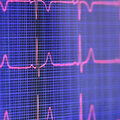
Researchers at the Leiden University Medical Center (LUMC) and Delft University of Technology have found a way to reset a racing heart immediately and automatically by an implanted LED device. In the scientific journal Science Translational Medicine, they describe how their bioelectronic defibrillator works in the laboratory. It could be the first step towards a pain-free treatment for patients with atrial fibrillation.
26 February 2019
Four fields of study at TU Delft in global top 10 of QS Subject Rankings
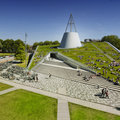
26 February 2019
Five Vici grants for TU Delft researchers
No less than five TU Delft will each receive 1.5 million euros from the Netherlands Organisation for Scientific Research (NWO).
25 February 2019
A world first: Reinier de Graaf increases safety and efficiency with track and trace in the operating theatre
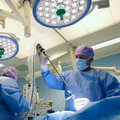
Doctor and PhD student Frederique Meeuwsen from BioMechanical Engineering conducted research on the potential application of RFID technology in the research theatre.
21 February 2019
Service sector has sizeable impact on urban energy demand

A better understanding of the energy demands of various users in the city – households and services such as schools, offices and shops – can facilitate urban energy transition. Nina Voulis offers this insight in her dissertation entitled Harnessing Heterogeneity, with which she will be awarded her PhD at TU Delft on 22 February 2019.
21 February 2019
A global network of radio telescopes exposes the aftermath of a violent generator of gravitational waves
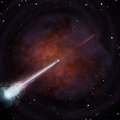
Astronomers have combined radio telescopes from five continents to prove the existence of a narrow stream of material (jet) emerging from the only gravitational wave event involving two neutron stars observed so far. These findings have now been published in the Science magazine by an international team of scientists, led by Giancarlo Ghirlanda from the National Institute for Astrophysics (INAF, Italy). Professor Leonid Gurvits (JIVE and TU Delft) is co-author of the Science paper.
21 February 2019
Dutch King opens Microsoft Quantum Lab on TU Delft campus
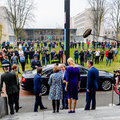
On 21 February, King Willem Alexander opened the Microsoft Quantum Lab on the campus of TU Delft. With the lab, Microsoft strengthens quantum research in Delft, a research area where TU Delft ranks among the world's best.
15 February 2019
New educational concept for teacher training in February
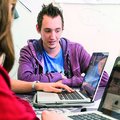
At the beginning of February, a new cohort of sixteen prospective teachers started the teacher training programme of the Science Education & Communication department. This is the first time that students will be able to start the study programme in February. The new cohort will also be exposed to a new educational concept.
06 February 2019
TU Delft signs contract with UNICAMP to host the TU Delft office in Brazil for coming 5 years
On 5 February 2019, Professor Marcelo Knobel, President of the largest technical university of Latin America in Campinas signed an agreement for collaboration with Professor Patricia Osseweijer, University Ambassador Brazil of TU Delft.
04 February 2019
A new approach for the fast estimation of the solar energy potential in urban environments

TU Delft researchers have developed a new approach for calculating fast and accurate the solar energy potential of surfaces in the urban environment. The new approach can significantly help architects and urban planners to incorporate photovoltaic (solar power) technology in their designs. The findings were presented on Monday 4 February in Nature Energy.
